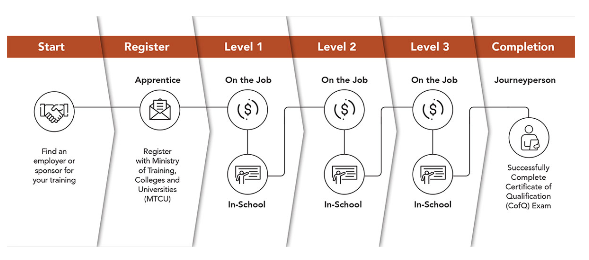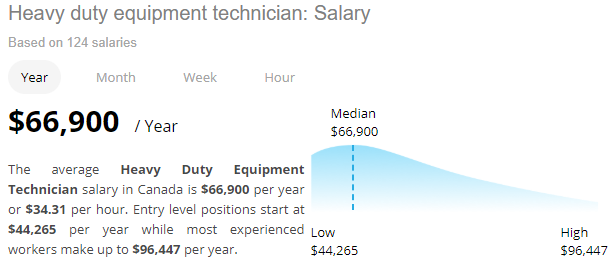Highest Paying Trade Jobs In Canada

We are here for part two of What Are The Most Lucrative Degrees? If you haven’t read out the first part, click the link. However, reading the last article is not necessary for understanding this one. The last articles talk about university and college degrees. However, we will be discussing which trade jobs are the most lucrative.
Trades are jobs that require an immense amount of skill. This skill is typically acquired by means other than getting a bachelor’s degree. Many jobs require skill and experience for you to work. This is a huge difference. Some jobs will look at your schooling to determine whether or not you’re suitable for a job. However, in the trade industry, they value skill, experience, and whether you’re legally allowed to work the job given. Therefore, we will discuss whether you should work trade jobs and which ones are the most lucrative!
Should You Work Trade Jobs?
Working a trade job is totally up to your discretion. However, there are a few things to remember. Trade jobs are highly skilled, mainly hands-on jobs. They require an intense amount of technical knowledge about the job at hand and safety. Many of these jobs are or can be dangerous. If they are, you’ll earn what is called danger-pay. This is a premium that the employer pays you based on how dangerous a job may be.
The fact that it is hands-on allows you to potentially charge more. For example, we had a broken fridge. Therefore, we called someone who fixes fridges to come to take a look. It turns out that one of the compartments was clogged. All the person did was rinse it, put it back in, and left. That whole process took approximately 20 minutes. We had to pay him $90. Multiply that by three and it’s $270 an hour. Of course, this amount varies greatly depends on a multitude of factors. However, it’s easy to see why some people may bypass earning their bachelor’s and going straight into trade jobs.
Related Articles
- From Hello To Hired: Breaking Through The Interview
- What Are The Most Lucrative Degrees? Pt. 1
- Are Vegan Diets Expensive? Find Out Now?
- 12 Ways To Earn Money In College
- 4 High-Return P2P Lending Platforms For Canadian Investors
5. Powerline Tech
The first job on our list of highest-paying trade jobs is a power line technician. If you remember what I said early, some jobs have danger-pay. This is one of them. However, what is a powerline technician and what exactly do they do? I had this same question.
If you’ve been outside anytime in your life, there is a good chance you’ve seen a powerline. They’re the wires that connect poles. A powerline technician is a person or group of people who put up and maintain these lines. However, they can install underground electrical systems. Therefore, powerline techs are responsible for making sure that the overhead and underground electrical systems are functional. Since this job sounds dangerous, how does the pay reflect?
The median income for powerline technicians in Canada is $52,000 per year. However, the higher earners can make $90,000+ per year while the bottom percentile is just around $26,000. There is a wide gap in income between the lowest and highest earners. However, this can serve as an incentive to gain more experience and skills. That way, you’ll be able to earn more money.
The job can be dangerous as you’re working with and around electrical systems. The voltage can be extremely high. Furthermore, if you’re erecting the poles or towers, you need to safe when off the ground. If you’re unsafe and fall from the height of a powerline, you may get more than just a bruise. Therefore, if you’re safe, you should not have a problem. However, the risk is always there. Here is a video that shows a day in the life of a powerline technician.
Schooling
Schooling for a powerline technician is quite different. You will need to graduate high school fully and possibly need a grade 12 math credit. The programs can last for 2 years and are often an apprenticeship. Here, you will earn on-the-job and in-class training that’ll help you prepare for when you graduate.
The price of schooling is considerably cheaper than a bachelor’s degree. The two years cost $1,850, with some extra expenses. However, these prices can change depending on the school you go to, area, and living arrangements.
Average Hourly Wage/Salary: $13/h – $46+/h OR $26,000/y – $90,000+/y
Tuition First Year: $1,200+
4. Steamfitter-Pipefitter
According to tradesecrets.alberta.ca, steamfitter–pipefitters layout, assemble, fabricate, maintain and repair piping systems that carry water, steam, chemicals, or fuel used in heating, cooling, lubricating and other processes. Steamfitters work on many different infrastructures.
They can work on nuclear power plants to power generating systems. However, the job is physically demanding and can require the worker to perform tasks such as climbing. Furthermore, the working conditions can be rather harsh because you will have to work both indoors and outdoors. If you live in an area that can get cold, such as Alberta, this may be a difficult pill to swallow.
The median income for steamfitters is a healthy $62,000 with a low of $39,000 and a high of $92,000. If you read the last article, What Are The Most Lucrative Degrees? Pt.1, you’d see that these jobs are actually on par with those that are acquired through a bachelor’s degree. However, this job isn’t completely safe, much like the powerline technician.
In addition to climbing, steamfitters constantly work around machinery. This machinery can be heavy, sharp, and quite dangerous. However, if you have an eye for detail and don’t mind a physically demanding job, you may want to look into the schooling.
Schooling
In terms of schooling, steamfitters must complete a 4-year apprenticeship program. This program includes on-the-job and in-class training. Once you’ve passed this training and earned your journeyperson certificate, you may take an exam to be certified to work as a steamfitter anywhere in Canada. However, it is possible to earn your certificate if you’ve graduated high school and have more than 5 years of experience. This depends on the province.
In NCSS, for example, the first-year tuition for a steamfitter is $3,415. However, if you’re not from Nova Scotia, it’ll cost you much more because you will have to move there. However, this is just used as an example to show how much it may cost. Schools like Thompson Rivers University have a course for as low as $2,475/ first-year.
Average Hourly Wage/Salary: $20/h – $47+/h OR $39,000/y – $92,000+/y
Tuition First Year: $2,400+
3. Heavy Duty Equipment Tech
A heavy-duty equipment technician is responsible for inspecting, repairing, and troubleshooting various heavy-duty equipment. The equipment that these people work on can vary. For example, heavy-duty equipment technicians are known to work on engines and transmissions. However, there are various sectors that they can work in. These sectors can range from construction to forestry and transportation.
In terms of compensation, heavy-duty equipment technicians can earn well over the average household. Let’s take a look at Neuvoo.ca and how much heavy-duty equipment technicians earn.
On average, heavy-duty equipment technicians earn almost $67,000 per year. As you’d assume, this job can be quite dangerous as well. Working alongside heavy machinery can be quite daunting and you have to be attentive at all times. However, the more experience you gain, the higher your income will be, much like other trade jobs.
There is a trend in many trade jobs. The more experienced people in all the trade jobs that we’ve discussed so far have almost identical incomes. Although they are separated by a couple of thousand, they are all near each other. However, the lowest earners are fairly low, sometimes as low as minimum wage in Ontario.
This is just further proof of how much trade jobs value experience and how it is correlated to your earnings. Trade jobs are highly competitive. Therefore, the salary reflects that competitiveness.
Schooling
Becoming certified as a heavy-duty equipment technician is similar to other trade jobs as you must go through a 4-year apprenticeship program. This program involves both on-job and in-class training. Once this is done you may pass an exam to obtain a seal that allows you to practice anywhere in Canada.
Schools like Centennial College offer programs for as low as $3,8000 for a 2-semester term. As always, this price changes depending on the school and the number of semesters. However, with the average heavy-duty technician earning over $60,000, this schooling should be a worthy investment.
Average Hourly Wage/Salary: $22/h – $49+/h OR $44,000/y – $96,000+/y
Tuition First Year: $3,800+
2. Oil Rig Manager
Being an oil rig manager is quite an interesting job. This is because it is one of the jobs that offer the least amount of work-life balance. Oil rig workers typically live on or near their site. There are times where they’re able to come back home but most of the time they’re away at work.
For those who don’t know, an oil rig manager is a person responsible for the supervision of oil and gas drilling rigs. This can be one or multiple people. They coordinate how the rig goes about drilling for oil, gas, and operating the rig. A lot of people do not like this job because they believe it to be controversial. However, if you’re not one of those people, this job can be for you. Since this is a managerial role, you won’t get this particular position right away. This is one of the jobs you need to work your way up to.
I came across this article by The Guardian where an ex-oil rig worker shares their experience on an oil rig. It’s quite an interesting read and I advise anyone who would like to get into this field to read this article. However, it’s time to take a look at the compensation.
Oil rig managers can earn up to $65+/h with a low of $23/h. In an annual salary, this equals $44,000 – $126,750. This is a huge difference between the last few jobs we have reviewed. Often time, oil rig managers have to live on-site or find living accommodations near their work. However, companies often pay out a daily living allowance to help.
Living on or near the site is not easy which is one of the reasons why the earnings potential is so high. You’re away from your family, sometimes working 12 hours a day. Furthermore, the living conditions on the site can be less than spectacular.
I once knew someone who was an electrician on an oil rig. He said although the money was good, the living conditions were harsh. It was dirty, cramped, and brutal in the winter. However, the money is enough for some people to work past all of these negatives.
Schooling
You don’t need an apprenticeship or specific certificate to become a rig manager, only a high school diploma. However, many companies do require a few certificates and a Journeyman certificate, as mentioned with other trade jobs. However, having a post-secondary degree in petroleum engineering can be advantageous when on the hunt for a job. Furthermore, garnering experience is always an asset as this is the number one thing that employers look for. Here are some of the education, certificate, and licensing requirements that may be needed.
These are some of the requirements that you’ll have to meet to become an oil rig manager. As we mentioned briefly, you can get a degree in petroleum engineering to increase your chances. A the University of Alberta, they have a 4-year course where you can get your degree. However, if you don’t live near the school, you’ll need to live on campus or find our living accommodations.
Tuition for the University of Alberta in the petroleum engineering program is estimated to be approximately $6,300. However, you will have to pay more than that because there are other associated fees such as the student union health plan and school supplies, to name a few.
Average Hourly Wage/Salary: $23/h – $65+/h OR $44,850/y – $126,750+/y
Tuition First Year: $0 – $6,000+
1. Construction Project Manager
Finally, we get to the number one position on our list, a construction project manager. A construction project manager is holistically responsible for the operations of a construction company. This means they have control over things like planning, organizing, directing, and evaluating what the construction company does in its activities.
These people are hired by construction companies for residential or commercial projects. They have a lot of responsibility. The compensation, however, can vary greatly. This can be for several reasons. However, it is quite possible to gain a spot within a bigger, commercial company and earn more than the median or highest earners that are shown below.
This job has the greatest gap between the lowest and highest earners at almost $100,000. It does, however, have the highest median and top-earning from all that we’ve seen. Much like a finance manager or head of a business, construction managers are in charge of day-to-day operations. They are responsible for the activities of the construction company. Therefore, they bear a lot of burdens.
Construction project managers have to deal with budget estates, hire and supervise staff/subcontractors, and develop quality control programs. These are only a few of the responsibilities that they have to oversee.
If you wanted a broader picture of what a construction manager is responsible for, take a look at the picture above. They are, quite literally, the boss and the glue that holds a construction company together. Depending on the size of the company there may be more than one. However, the sheer amount of skill and know-how that construction project managers have is astounding.
Schooling
Although this is a trade, many construction project managers go out of their way to get a bachelor’s degree. However, not every university offers programs in construction management. Therefore, potential managers look for degrees in engineering or something that is related. Although this is a good path to follow, it isn’t the only one. Just like all the other trade jobs, this requires a lot of experience for you to truly break into the industry.
If you do want to go to school, there are many construction management courses available throughout Canada that’ll prepare you for such activities.
For a school such as Centennial College, the construction management course lasts 3 semesters. In total, you’ll be paying out over $8,000. However, the course is designed to prepare you for your life in construction management. The course covers business principles and procurement management, to name a few. Although not 100% mandatory. I would strongly suggest taking a look at a few construction management courses just to make yourself familiar. This way you’ll have more understanding and it’ll look good when you’re looking for a job in your field.
Average Hourly Wage/Salary: $22/h – $61+/h OR $44,000/y – $140,000+/y
Tuition First Year: $0 – $8,000+
The End
Finally, we’ve come to the end of the two-part article. We hope that you were able to pick up some useful information along the way! Remember, going into a trade job or even getting a bachelor’s degree can be a great idea. Just make sure it’s something you want to do and can see a future in. Schooling should be looked at as an investment. Therefore, you want to get your money back as soon as possible.
If you’re ever in the mood to job hunt, try using jooble.org. They’re a search engine that can help you find jobs within your area. Furthermore, they’re in cooperation with Monster.com and Uber. Give them a try when you have the chance
Happy investing and good luck!

Shameed is just a man on a mission to help those around him gain financial success. Obsessed with writing about all things finance, this GTA native is constantly learning and sharing his experiences with others.
















